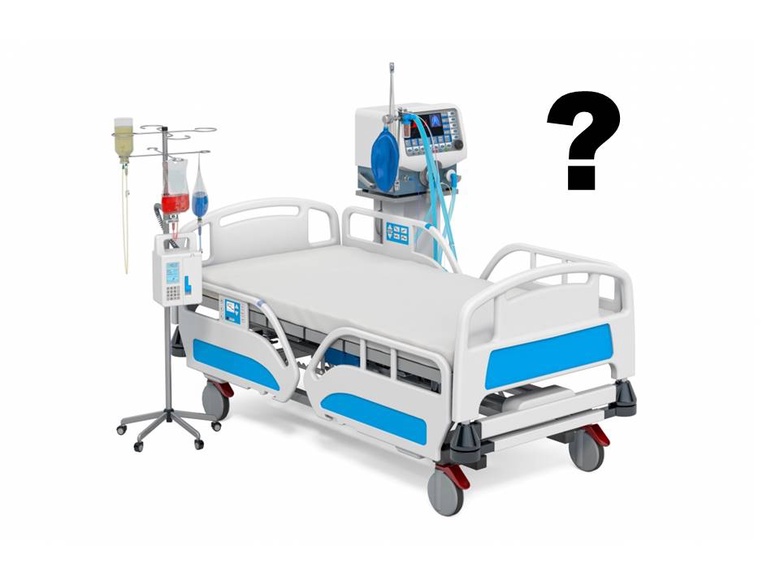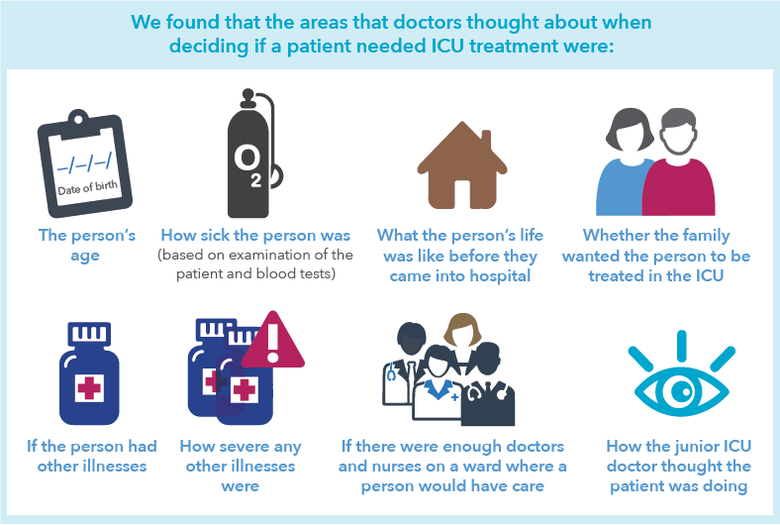Deciding whether to refer a patient to an Intensive Care Unit (or Critical Care Unit) has always been a difficult clinical and ethical challenge. The limited number of ICU beds means that decisions often have to be made about who should be referred and who should not. Intensive care can have a negative impact on the patient’s quality of life. Treatment is invasive and distressing and, for those patients who do not survive to leave hospital or who survive with a quality of life they do not value, ICU treatment may have caused harm rather than provided benefit. Optimum treatment for these patients may be better provided outside intensive care and may include a focus on palliative or comfort care. Patients are often too sick to engage, meaning patient preferences are not considered. There is often imperfect information, with consultants not having full information about patient cases and, therefore, not always able to predict how patients will respond to intensive care.

The COVID-19 pandemic has intensified these issues, increasing the challenges that ICU doctors currently face when deciding who to admit to intensive care. The National Institute for Health and Care Excellence (NICE), a national body that provides guidance on the provision of care in the NHS, have developed a COVID-19 rapid guideline on critical care in adults to help health professionals make decisions about admitting patients to ICU. The guideline makes use of some research we undertook to try to understand and to support consultants in making ethical decisions.
Our research, funded by the National Institute for Health Research (NIHR), and carried out in collaboration with the University of Warwick Medical School, had four stages:
- Stage 1: We reviewed other research about what factors doctors consider when deciding whether or not to refer patients to ICU.
- Stage 2: We went to hospitals to observe how doctors make these decisions.
- Stage 3: Informed by Stages 1 and 2, we did a survey (a discrete choice experiment) of ICU doctors to see what factors are important to them when they make these decisions, and how important.
- Stage 4: Informed by Stages 1-3, we put together and tested a decision support pack to help doctors making these difficult decisions.
From Stages 1 and 2, we identified the areas that doctors thought about when deciding if a patient needed ICU treatment. These are shown in the diagram below:

These eight factors were included in our survey (Stage 3). We found that the patient’s age had the largest impact at admission followed by the views of their family and severity of other illnesses. How sick the patient was had less impact than how the junior ICU doctor thought the patient was doing. The least important factor was if there were enough doctors and nurses on a ward where a patient would have care.
Informed by Stages 1-3, Stage 4 developed a decision support pack that included:
• A step-by-step guide about what needs to be thought about for a clear and fair decision.
• Forms that helped give the right information to make a good referral for ICU treatment.
• Patient and family information leaflets.
NICE has recommended the use of our decision support pack in their COVID-19 rapid guideline on critical care in adults. We hope our research and decision support pack can help all those involved in difficult decisions about who to admit to ICU during the COVID-19 pandemic and beyond.
The resources below describing our study and the results are available in open access:
Bassford, C.R., Krucien, N., Ryan, M., Griffiths, F.E., Svantesson, M., Fritz, Z., Perkins, G.D., Quinton, S. and Slowther, A.-M. (2019) 'U.K. intensivists’ preferences for patient admission to ICU: evidence from a choice experiment', Critical Care Medicine, 47(11), 1522-1530.
Full research report:
Bassford, C., Griffiths, F., Svantesson, M., Ryan, M., Krucien, N., Dale, J., Rees, S., Rees, K., Ignatowicz, A., Parsons, H., Flowers, N., Fritz, Z., Perkins, G., Quinton, S., Symons, S., White, C., Huang, H., Turner, J., Brooke, M., McCreedy, A., Blake, C. and Slowther, A. (2019) 'Developing an intervention around referral and admissions to intensive care: a mixed-methods study', Health Services and Delivery Research, 7(39).
More details of the study, including an easy read version of the report and a two-page summary, are available at the University of Warwick Medical School project page.

Many thanks to HERU Director, Professor Mandy Ryan, for her work on developing this Blog post.

HERU is supported by the Chief Scientist Office (CSO) of the Scottish Government Health and Social Care Directorates (SGHSC). The views expressed here are those of the Unit and not necessarily those of the CSO.


